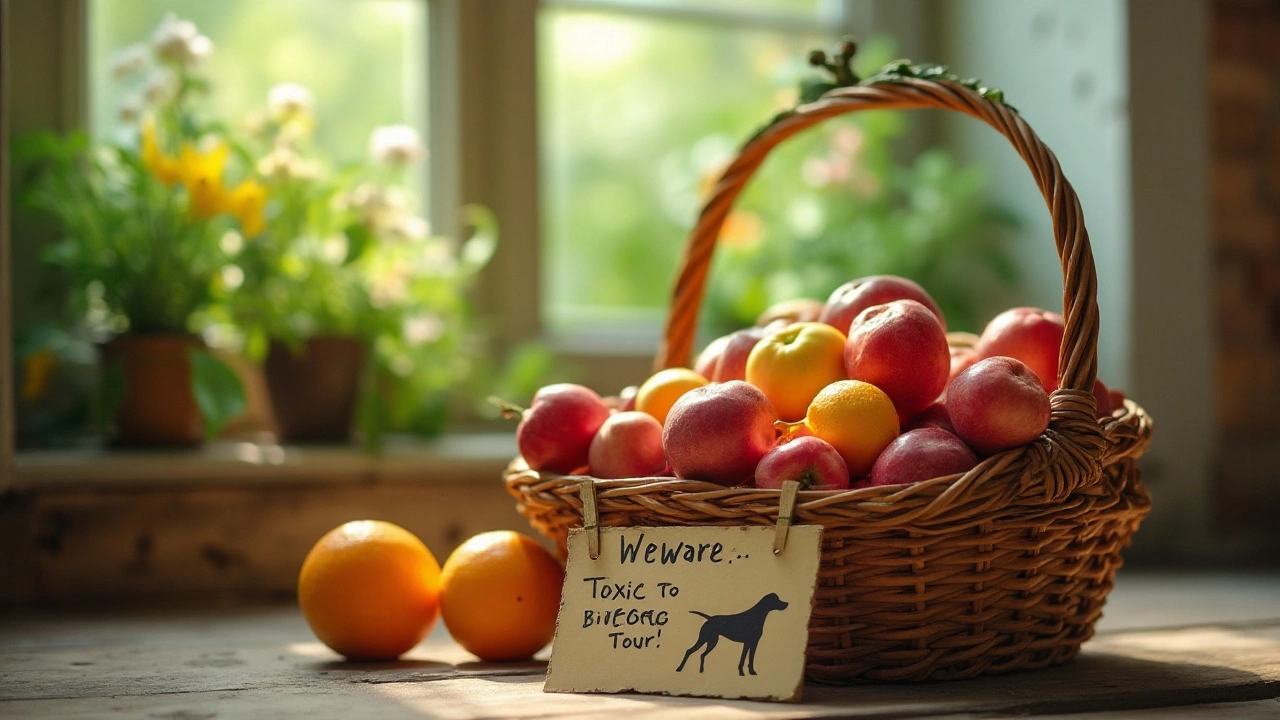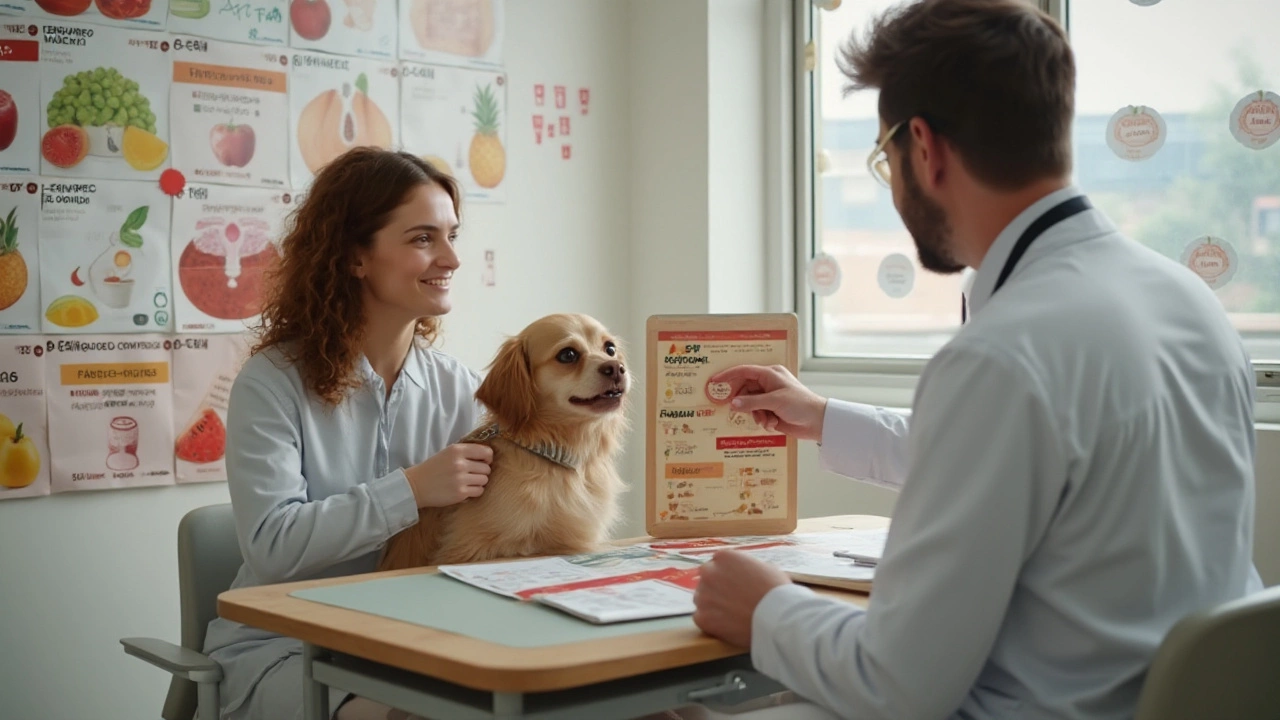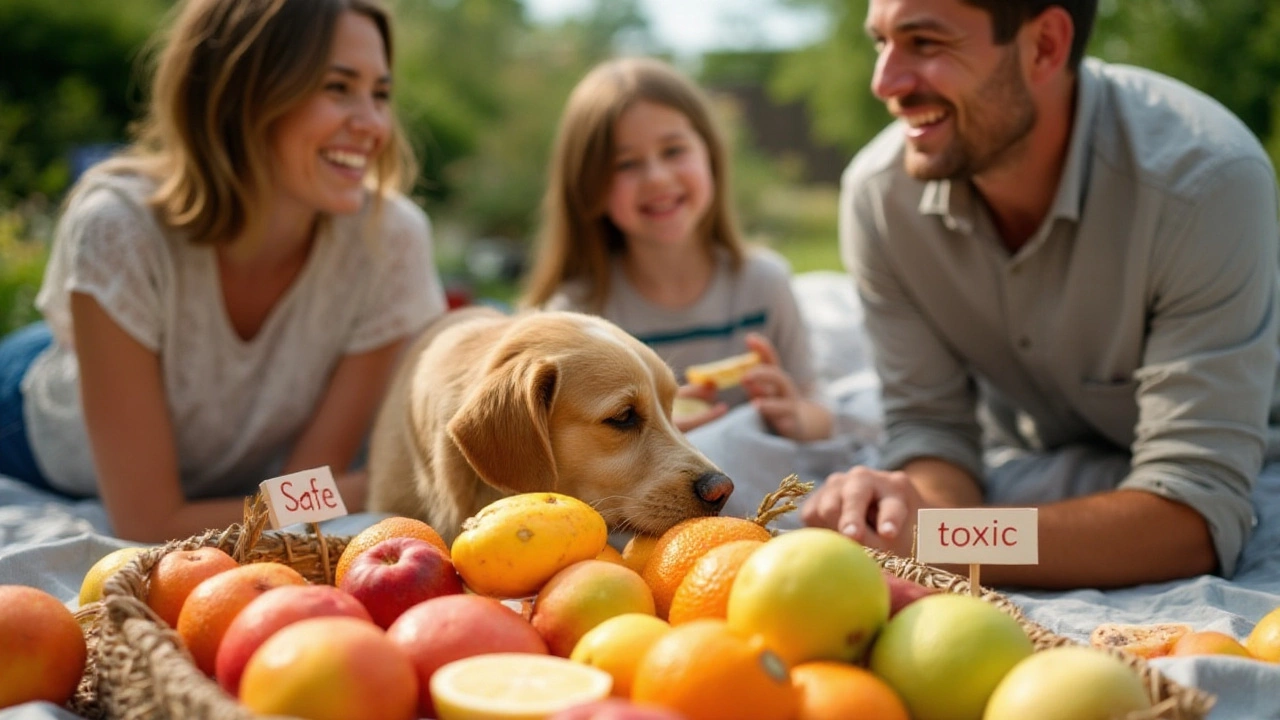Our beloved canine companions often gobble up almost anything handed to them. However, not all offerings from the fruit bowl are safe for their consumption. While many fruits are healthy for dogs, it's crucial to be aware of those that aren't.
This guide sheds light on certain fruits you should keep away from your pup. After all, knowledge is the first step to keeping your furry friend safe and sound. Let's dive into the mindful world of feeding Fido and ensure we avoid any fruit faux pas!
- Dangerous Fruits for Dogs
- Grapes and Raisins
- Cherries and Their Pits
- Citrus Fruit Concerns
- Avocado Hazards
- Recognizing Symptoms of Fruit Poisoning
Dangerous Fruits for Dogs
Delighting in the refreshing crunch of an apple or the sweet savor of a grape is a pleasure shared by many, but when it comes to our dogs, not all fruits are meant for them. Grapes, raisins, cherries, avocados, and certain citrus fruits pose significant risks to our furry friends' health. Understanding these dangers can protect our pets from unintended harm. Dogs and fruit don't always mix well, and being informed is vital for keeping your canine safe.
Take grapes and raisins, for example. They are small, seemingly harmless bites of sweetness for humans, but they can lead to severe outcomes including kidney failure in dogs. The exact reason grapes and raisins are so toxic is still a mystery to many researchers. They remain a fruit that dogs simply must avoid at all costs. If your dog happens to munch on a few, urgent veterinary attention is crucial. Symptoms like vomiting or a decrease in energy can appear rapidly, sometimes within hours.
"It's critical for pet owners to immediately consult with their veterinarian if their dog has ingested raisins or grapes," advises Dr. Emily Stone of Pet Health Associates. "Early intervention can be life-saving."
Cherries, while delicious to humans, present another hazard. The primary concern here is the pit, which can block the digestive tract and also contains cyanide, a deadly substance. The fruit itself seems unthreatening until you realize these stealthy seeds pose a choking hazard alongside their toxic content. Symptoms from ingesting cherries may include difficulty breathing and dilated pupils.
Even the benign appearance of citrus fruits like oranges, lemons, and limes can be deceiving. While a small bite might not be catastrophic, the citric acid and essential oils can cause stomach upset in dogs, and their peels might lead to additional irritation or blockage. Avocados pose unique challenges as they contain persin, a toxin that is especially harmful in large qualities. Although mostly harmless to people, they can be harmful to animals, leading to vomiting or even severe heart complications.
For conscientious pet owners, knowing these details is vital. Keep these fruits out of reach and watch for any unexpected exposure to them. To further ensure safety, regularly review your knowledge of pet-friendly foods and consult your vet when unsure. Remember, an ounce of prevention is worth a pound of cure when it comes to safeguarding your pooch's health! With these insights, you'll be better prepared to make informed decisions that keep your precious pets both happy and healthy.
Grapes and Raisins
Grapes and raisins are small, ubiquitous snacks loved by many humans for their sweetness and health benefits. However, when it comes to dogs, these fruits are a different story altogether. They are known to pose severe health risks that can lead to acute kidney failure in dogs. Surprisingly, the exact substance in grapes that causes such toxicity isn’t entirely understood by veterinary experts. What’s clear, however, is that its effects can range from vomiting and lethargy to more severe cases like complete kidney failure, which is often fatal if left untreated.
The symptoms of grape or raisin toxicity in dogs can appear within a few hours of ingestion. Initially, a dog might vomit or have diarrhea, signaling early toxicity. As time progresses, more critical symptoms emerge, like loss of appetite, dehydration, and notable increased or decreased urination, often an indicator of kidney troubles. Spotting these signs early can make all the difference, highlighting the importance of urgent veterinary care. John Smith, a professor of veterinary medicine, once mentioned,
"Immediate attention is crucial when it comes to grape ingestion in dogs. Even a small quantity can result in severe reactions, so acting quickly is imperative."
When considering safe pet practices, prevention is better than cure. Store grapes and raisins far out of your pet's reach and be vigilant about keeping such snacks off countertops or tables where a curious dog might sneak a taste. You might also inform friends and family who visit your home about the dangers these toxic fruits pose to dogs. Being proactive truly matters. Another step is reading the labels when purchasing packaged foods, as some might unknowingly contain derivatives of grapes or raisins. Always double-check the ingredients list and opt for raisin-free versions whenever possible.
What if your dog accidentally eats grapes or raisins? It’s crucial not to wait for symptoms to appear. Contact your veterinarian or a pet poison helpline immediately for advice tailored to your situation. Prompt action could not only save you, the pet owner, substantial heartache but could also mean life or death for your beloved canine. A side note for dog owners to remember: never induce vomiting at home without professional guidance as this can sometimes worsen a dog's condition. Leaving it to the experts ensures your furry friend gets the safest treatment.
Raisin-Laced Products and Hidden Dangers
In a world where delicious treats often come packed with unexpected ingredients, it’s wise to consider indirect exposure, too. Raisin cookies, pastries, or trail mixes might all be harmless-looking but are menacing threats as they contain raisins or grape extracts. The problem is, not many people remember or realize that these foods pose risks when within a dog’s reach. This calls for a shift towards caution and awareness in food handling and storage in homes with pets. Dog parents can even embark on crafting their own pet-safe snacks to avoid any mishaps. There’s a sense of satisfaction and security knowing exactly what you’re feeding your furry companion.
Cherries and Their Pits
When it comes to nurturing our furry companions, understanding their dietary needs is as important as knowing the back of your hand. Cherries are a fruit that straddles the line between caution and delight. At first glance, they appear to be a harmless treat, with their juicy flesh and sweet flavor. But, hidden dangers lurk within these ruby gems, mostly centered around the pits. The pits, leaves, and stems of cherries contain cyanogenic glycosides, which can release cyanide when metabolized. Cyanide is highly toxic to dogs, even in small amounts, and can lead to difficulty breathing, dilated pupils, and potential organ failure.
It's not just the cyanide that poses a risk. Choking hazards are another concern, especially for smaller dog breeds who might take the whole cherry into their mouths. The pits are hard and can easily become lodged in the throat or cause gastrointestinal blockages. When considering cherries as a treat, always ensure pits are entirely removed and dispose of stems and leaves with due diligence. Despite understanding the risks, some pet parents may inadvertently offer their dogs cherries without knowing the full extent of potential harm. It's a common mistake but one we should strive to correct.
"Just one cherry pit can lead to serious health issues for your dog," warns Dr. Jasmine Shah, a noted veterinarian and pet nutrition expert.
A notable fact is that the cherry's flesh doesn't contain the toxic component; it's quite safe in moderation once properly prepared, much like the way removing seeds from a watermelon before consumption is standard practice among canine guardians. But the effort to pit cherries can deter even the most devoted pet owners from sharing these fruits with their dogs. Other, less risky alternatives include blueberries or apples (seed-free), providing similar satisfaction without the associated threats.
Once the unseen dangers and preparation steps are widely acknowledged, cherries might still seem like a lot of effort for a quick treat. For those who prefer not to take even the smallest risk, there are many dog food compatible fruits available, allowing you to treat your pet without worrying about cyanide or blockages. Knowledge is an essential tool in pet ownership, fostering a proactive approach to health through dietary caution and awareness.
It is vital for any dog owner to be mindful of these considerations. And sometimes, for the sake of our beloved pets, it's best to keep those bright-red cherries for ourselves, ensuring dogs munch safely on less risky snacks that let you sleep easy, knowing they're happy and, more importantly, healthy.
Citrus Fruit Concerns
When it comes to feeding our dogs fruits, many might assume citrus fruits would be a refreshing treat. They're juicy, aromatic, and packed with vitamins for humans. But our four-legged pals experience these fruits quite differently. It's crucial to understand that while they may not be deadly, citrus fruits like lemons, limes, and grapefruits can cause a slew of digestive issues in dogs. The culprit here is a compound known as psoralen and certain essential oils that are naturally found in these fruits. Ingesting these in sufficient quantities can lead to upset stomach, vomiting, diarrhea, or central nervous system depression if a dog consumes a lot. Such symptoms can be terrifying for pet owners and uncomfortable for the dogs themselves.
Many pet owners might have observed that their dogs instinctively shy away from citrus fruits. Perhaps this is due to their acute sense of smell, which is many times more sensitive than ours. The intense aroma of citrus, which humans find invigorating, can be overwhelming for canines. This natural aversion helps protect dogs from the adverse effects these fruits can deliver. It's typically the tartness and bitterness combined with the strong scent that makes them back off immediately. Still, not all dogs heed this instinct, especially those with a more adventurous palate. It's up to owners to ensure their dog food remains free of these fruits.
There is an interesting piece of data that pet owners should know about citrus fruits and dogs.
According to Dr. Jennifer Coates, a renowned veterinarian and advisory board member for Pet Life Today, 'While small amounts of these fruits or their juices may not be a major issue, it is the skin, seeds, and leaves that contain the highest levels of toxins.'Thus, keeping these parts away from dogs is crucial. Despite some anecdotes about dogs enjoying small pieces of oranges, these should be given cautiously, if at all.
For those still tempted to offer their dogs a slice or segment, here's a handy approach: always peel off the skin, remove all seeds, and wash them thoroughly to reduce any risk of pesticide residue. Some dogs do enjoy a bit of orange, which can provide vitamin C, but moderation is key to ensuring there are no digestive repercussions. Still, it's wise to consult regularly with a veterinarian about introducing any new foods to your dog’s diet. This ensures that any potential changes are backed by professional advice specific to the individual needs of your pet, safeguarding their well-being while keeping them happy and healthy.

Avocado Hazards
While avocado may be a trendy fruit among humans, spreading joy in the form of guacamole and smoothies, it spells trouble when served up to our dogs. Avocados contain a substance known as persin, a fungicidal toxin which, although relatively harmless to humans unless one is particularly sensitive, can present dietary problems for dogs when consumed in large amounts. This naturally occurring toxin is found in all parts of the avocado, including the leaves, fruit, seeds, and bark, making it a comprehensive threat sneaking around your kitchen counter.
For curious dogs with a penchant for table scraps, ingesting significant quantities of avocado can lead to vomiting, diarrhea, and more severe cases of pancreatitis due to the fruit's high fat content. Canine digestion does not appreciate surprises in its flow and balance, and while a lick of guacamole here and there might not herald an emergency vet visit, owners should be cautious about significant avocado exposure. The hefty seed can also pose a choking hazard or fine example of intestinal blockage if swallowed whole or in chunks.
According to the American Society for the Prevention of Cruelty to Animals (ASPCA), "Even though there is some controversy around the risk posed by persin, it is always best to err on the side of caution, especially since the high fat content can cause digestive distress."
The nuanced debate about persin's toxicity levels highlights essential daily vigilance in pet care. One needs to watch not only what is on the menu but also what accidentally rolls onto the floor during food prep. Avocados are undeniably creamy and nutritious for people, but what we digest blissfully could play havoc on our hounds. Elevated fat levels, when not controlled, may trigger feelings of lethargy and discomfort in dogs, resembling symptoms of those pesky common dog ailments we often hastily associate with other causes.
To play it safe, consider following these guidelines: Store avocados out of reach, ensuring they are not accessible to your pet's persistent nose. Dispose of avocado skins and pits immediately, discouraging any forage attempts by your furry friend. Also, educate friends and family about the potential risks of feeding dogs this ubiquitous superfood.
Another fascinating point worthy of consideration is the nature of different dog breeds and their varying levels of sensitivity to avocado. Observations often show that smaller breeds might experience symptoms more acutely than larger dogs due to their size and metabolic rate. Still, every dog is different, bringing delightfully unique traits to their happy waggle walks beside us. Keeping these tips in mind ensures that when it comes to avocados, you’ll only cry from the cutting-board onions and not from emergency vet visits.
Recognizing Symptoms of Fruit Poisoning
Fruit poisoning in dogs can sometimes be subtle, and other times it can present itself with alarming intensity. Whether your dog has accidentally consumed grapes, avocados, or cherries, it's important to know the signs of trouble. Vomiting is one of the most common early symptoms you might notice after your dog eats a fruit it shouldn't have. This is the body's way of trying to expel something that doesn't sit well. Beyond vomiting, diarrhea can also occur, leading to dehydration if not managed properly, so keep a close eye on your pup if accidents happen.
Another symptom to watch for is lack of energy, or lethargy. You know your dog's usual energy levels, so if it suddenly seems uncharacteristically tired and listless after a fruit incident, it could indicate that something is amiss. In more severe cases, especially with fruits like grapes or raisins, you might notice a decrease in appetite followed by changes in drinking and urination patterns. Such symptoms can herald kidney problems, which are incredibly serious. Knowing this isn't to scare you, but rather to empower you to act quickly and decisively should it become necessary.
Neurological symptoms, albeit rare, can occur if the fruit poisoning is left untreated and the toxin levels escalate. Your dog might exhibit tremors, seizures, or even a state of confusion. While it's something no pet owner wants to envision, being prepared for these possibilities is critical. Observational vigilance and timely action can often prevent these scenarios from escalating. A quote from Dr. Karen Becker offers reassurance, "Knowing the warning signs and acting promptly can save your dog's life. Don’t hesitate to consult your vet if something feels off."
If you suspect that your dog has eaten any fruits deemed unsafe, it's crucial to consult with your veterinarian immediately. Time is often of the essence in these cases. Keep in mind, not all fruits will have the same impact, and some signs can appear as soon as a few hours after ingestion, while others might not surface for days. This delayed onset can make it tricky to connect the cause, emphasizing the importance of vigilance.
